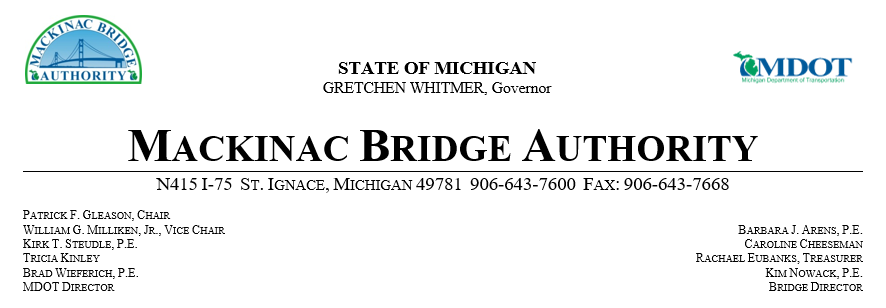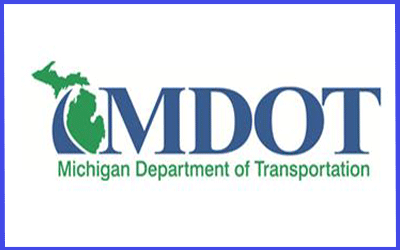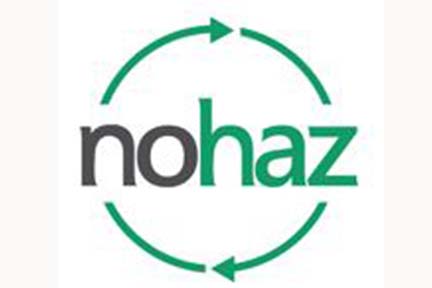
by orionontv | Apr 17, 2024 | Transportation

FOR IMMEDIATE RELEASE
April 17, 2024
|
|
MEDIA CONTACT
James Lake
906-250-0993
[email protected] |
The Mighty Mac’s expanded Antarctic connection
ST. IGNACE, Mich. – When Brendan Fisher began his 13-month adventure as a heavy equipment mechanic for the United States Antarctic Program (USAP), he brought pieces of the Mackinac Bridge with him. When he returned, he brought a piece back, as well as stories to accompany it, that he presented this month to the Mackinac Bridge Authority (MBA).
At the MBA’s April 5 meeting in Dimondale, Fisher presented the authority with a shadowbox containing a piece of the bridge’s original deck grating and photos from his time at the South Pole. A noticeable circular piece is absent, representing a disc that is now part of the ceremonial South Pole marker more than 9,000 miles away.
Fisher, whose assignment in Antarctica ran from October 2022 to November 2023, and fellow South Pole adventurer Hans Suedhoff brought the gift and a photo book documenting the Mackinac Bridge pieces that were incorporated into a sign, photo frame, and both the ceremonial and geographic South Pole markers.
Fisher had previously built the sign from a 38-foot piece of the original deck grating he purchased through auction in November 2020, proclaiming the distance from the South Pole to the Mackinac Bridge (9,394 miles), which is on permanent display at the station.
There are two pole markers since the Antarctic 9,300-foot-thick ice sheet (roughly a third of the length of the Mackinac Bridge) moves about 10 meters per year. “There’s Mackinac Bridge in both of them now,” Fisher said.
The Authority thanked Fisher and Suedhoff for the gift, which recognizes the bridge and the team in the Antarctic.
“I think it’s absolutely fantastic,” said MBA Member Barbara Arens. “You’re very talented.”
Each year, the geographical South Pole is replaced on Jan. 1. Once the year’s marker is retired, it joins its predecessors in a display cabinet at the Antarctic station for 20-30 years until the cabinet fills to capacity. After that, the markers are sent to the Smithsonian, where they stay “until the end of eternity,” Fisher said.
The team also used pieces of round steel stock from the bridge to make four bolts that joined corners of a photo frame for a picture of last year’s “winterover” crew at the station, which included Fisher and Suedhoff.

by orionontv | Apr 17, 2024 | Health and Wellness
|
Press Release
FOR IMMEDIATE RELEASE: April 17, 2024
CONTACT: Chelsea Wuth, 517-241-2112, [email protected]
MDHHS, MDARD remind Michiganders about risks of consuming raw (unpasteurized) milk and milk products
LANSING, Mich. – The Michigan Department of Health and Human Services (MDHHS) and Michigan Department of Agriculture and Rural Development (MDARD) are reminding residents of the risks associated with consuming raw (unpasteurized) milk amid the current Highly Pathogenic Avian Influenza (HPAI) outbreak affecting dairy cow herds. This virus has the potential to spread to humans, with one case reported this year in Texas.
“Anyone can get sick from drinking raw milk, but children under age 5, adults over age 65 and those with weakened immune systems are more at risk for getting sick,” said Dr. Natasha Bagdasarian, chief medical executive. “Now that HPAI is infecting both cows and birds, it’s important to make sure that you are consuming food that is safe, including ensuring that the milk products you eat or drink are pasteurized.”
Pasteurized milk is extremely safe and has undergone a heating process which kills disease-causing germs like Campylobacter, E. coli and Salmonella. People who consume raw (or unpasteurized) milk, cheeses and other dairy products like ice cream created from raw milk are at risk for a variety of illnesses. Only pasteurized milk is sold in stores and provided to children in school lunches.
People can get ill from the same source and product of raw milk they drank previously – milk that someone consumes from the same farm over a duration of time may not always be safe. Raw milk can get contaminated in many ways. While good safety practices can reduce the chance of germs getting in raw milk, they cannot eliminate risk.
The Food and Drug Administration does not currently have concerns about the safety or availability of pasteurized milk products nationwide. Pasteurization has continually proven to inactivate bacteria and viruses, like influenza viruses, in milk and is required for any milk entering interstate commerce.
The Centers for Disease Control and Prevention recommends taking the following steps to reduce risk:
- Choose pasteurized milk and dairy products.
- Refrigerate milk, dairy products and other perishable food at 40⁰F or colder.
- Throw away expired food, including milk and dairy products.
For more information, visit CDC.gov/foodsafety/rawmilk. |

by orionontv | Apr 16, 2024 | Health and Wellness
|
Press Release
FOR IMMEDIATE RELEASE: April 12, 2024
MDHHS CONTACT: Lynn Sutfin, 517-241-2112, [email protected]
MSP CONTACT: Lori Dougovito, 517-281-9586, [email protected]
State Agencies Collaborate to Help Protect
Children from Unintentional Firearm Injuries
Free Gun Locks Available at MDHHS Offices Statewide
LANSING, MICH. – The Michigan State Police (MSP) and Michigan Department of Health and Human Services (MDHHS) announced today they are partnering together to protect children from unsecured firearms. Using $500,000 in state funding appropriated in the FY24 MSP budget, the MSP facilitated the purchase of 75,000 cable-style gun locks from Project ChildSafe that will be available for free at MDHHS county offices starting today and some local health departments while supplies last. All MDHHS offices should have gun locks available no later than June.
In 2020, firearms injuries became the number one cause of death for children in the United States and Michigan, surpassing motor vehicle deaths and those caused by other injuries.
“We are partnering with Michigan State Police, local MDHHS offices and our local health departments, to help prevent these tragedies and keep Michigan children and families safe from firearm violence,” said Elizabeth Hertel, MDHHS director. “Our department is devoted to improving the safety and well-being of Michigan children, as outlined in our Keep Kids Safe Action Agenda, and actions such as implementing gun locks are going to make a difference when it comes to prevention efforts around firearm safety.”
Public Act 17 of 2023, which took effect Feb. 13, 2024, generally requires individuals to keep stored or unattended firearms unloaded and locked with a locking device or stored in a locked box or container if it is known or reasonably should be known that a minor is, or is likely to be, present on the premises.
“Under Michigan’s newly enacted Safe Storage (Child Access Prevention) Law, individuals can be held criminally responsible for improperly storing or leaving unattended a firearm where a minor is present or likely to be present if the minor obtains the firearm,” said Col. James F. Grady II, director of the MSP. “Because this law seeks to prevent injuries and deaths, we want to make safe storage as easy and accessible as possible so in addition to obtaining a gun lock from many police agencies, Michiganders can now also come into a MDHHS office to pick one up, no questions asked.”
Michigan residents can visit their local MDHHS office to request one of the free gun locks while supplies last, and they can also check with their local health department, some of which will have gun locks available. MDHHS staff who make home visits will also be able to access gun locks if a client has a need or wants to request one.
Free gun locks can also be obtained through Project ChildSafe police partners across the state.
Gun lock installation instructions are included within the product’s packaging and available on the Project ChildSafe website.

The Michigan State Police (MSP) and Michigan Department of Health and Human Services (MDHHS) announced they are partnering together to protect children from unsecured firearms through the distribution of free gun safety locks. Pictured are (l. to r.) from MDHHS, Lenier Holston, district manager; Elizabeth Hertel, director; Dr. Natasha Bagdasarian, chief medical executive and from MSP, Nancy Becker Bennett, Grants and Community Services Division, division director; Col. James F. Grady II, director; and F/Lt. Michael Shaw, Communications and Outreach Division, PIO section commander. |

by orionontv | Apr 16, 2024 | Transportation
FOR IMMEDIATE RELEASE
April 15, 2024
|
|
MEDIA CONTACT
Michael Frezell
517-281-6519
[email protected] |
MDOT launching public survey to collect travel data vital to
transportation planning in the state
Fast facts:
- MDOT is launching a household travel survey, MI Travel Counts, this week.
- Randomly selected households in Michigan will have the opportunity to participate via smartphone application, web or telephone.
- Data collected from this survey will provide information on how travel behavior has changed over the past 10 years and inform forecasts to help shape Michigan’s transportation system.
LANSING, Mich. – The Michigan Department of Transportation (MDOT) is kicking off a household travel survey that will provide information necessary to set transportation priorities for the next 20 years. Starting April 15, randomly selected households across Michigan will have the opportunity to provide details regarding how they travel.
The survey, MI Travel Counts, will be conducted by nationally recognized research firm Resource Systems Group, Inc. (RSG) on behalf of MDOT. Survey results will help transportation planners better understand how, when, where, and why people travel in and around the state of Michigan. Last conducted in 2015, this update will help planners account for the many changes in travel that have occurred, like the prevalence of remote work, the increase in online shopping, and greater use of ridesharing and delivery services.
Randomly selected households will receive an invitation to participate in the survey via U.S. Mail. Upon accepting the invitation, household members will provide demographic data and then report their travel either via a smartphone application, online or by telephone. The information provided to MI Travel Counts will be anonymized and aggregated to calculate statistics for study purposes.
This survey will be conducted in three phases. The first is scheduled from April 15 through early June, with additional phases anticipated in spring 2025 and fall 2025.
Invited households will be selected at random across the state, with survey materials available in English, Spanish and Arabic. Participation is possible through smartphone application, web or telephone. For more information about MI Travel Counts, visit www.MITravelCounts.com.
About RSG:
RSG conducts research on behalf of public and private sector clients using software applications, smartphones, websites, surveys, computers, tablets, and other means of collecting data. They specialize in designing, implementing and applying sophisticated data-driven models with in-depth analytics to help clients understand why people and systems do what they do.

by orionontv | Apr 15, 2024 | Local News
Oakland County Household Hazardous Waste Dropoff Events Promote Environmental Stewardship and Safeguard Communities
Post Date:04/15/2024 12:14 PM
- NoHaz events are scheduled for April 27, June 1, July 20, and Sept. 14. Registration opens approximately three weeks prior to each collection event at NoHaz.com.
- Residents of NoHaz communities may dispose of their household hazardous waste for a nominal fee of $15 or $30, or at no charge, depending on their community.
- More than 9 million pounds of household hazardous waste have been properly disposed of since the program’s inception in 2003.
Pontiac, Mich. – NoHaz, a consortium of communities in northern Oakland County for disposing household hazardous waste, has scheduled four collection events April through September, giving residents of these communities convenient opportunities to get rid of everything from outdated computers and dead batteries to paints, pesticides and more.

“Our NoHaz household hazardous waste collection events demonstrate our commitment to sustainability and environmental stewardship and empower Oakland County residents to responsibly dispose of hazardous materials,” County Executive Dave Coulter said.
All 2024 NoHaz collection events run from 8 a.m. to 2 p.m. on the following Saturdays:
- April 27, Oakland County Service Center Campus, 1200 North Telegraph Road., Pontiac
- June 1, Oxford Middle School, 1420 Lakeville Road, Oxford
- July 20, Kensington Church, 4640 S. Lapeer Road, Orion Township
- Sept. 14, Oakland County Service Center Campus, 1200 North Telegraph Road, Pontiac
Registration opens approximately three weeks prior to each collection event at NoHaz.com. Those unable to register online will be able to complete forms at the collection events.
Akzo Nobel, a global company in Pontiac dedicated to sustainability, is sponsoring the NoHaz collection events. Their partnership helps ease rising costs for member communities and residents.
NoHaz member communities include Addison Township, Clarkston, Groveland Township, Independence Township, Lake Angelus, Lake Orion, Leonard, Oakland Township, Orion Township, Oxford Township, Oxford Village, Pontiac, Rose Township, Springfield Township and Waterford Township.
Residents of NoHaz member communities may dispose of their household hazardous waste for a nominal fee of $15 or $30, or at no charge, depending on their community. Any Oakland County resident who does not reside in a NoHaz community may dispose of acceptable materials at any collection event for a fee of $130. They may also contact their city, village, or township to ask if another program is available or click on this link to view a map of available household hazardous waste programs in the county.
With more than 9 million pounds of household hazardous waste properly disposed of since its inception in 2003, NoHaz is providing Oakland County residents with an opportunity to do the safe and responsible thing with their household hazardous waste.
For more information on NoHaz and disposing of household hazardous waste responsibly, click on NoHaz.com.
The NoHaz Consortium is a group of Oakland County communities that have come together to provide residents with a safe, reliable, and environmentally responsible way to dispose of household hazardous waste (HHW). These wastes are substances in a home that can be harmful to humans and the environment if not disposed of properly. Each year, NoHaz schedules collection events to provide disposal opportunities for residents of the member communities.











